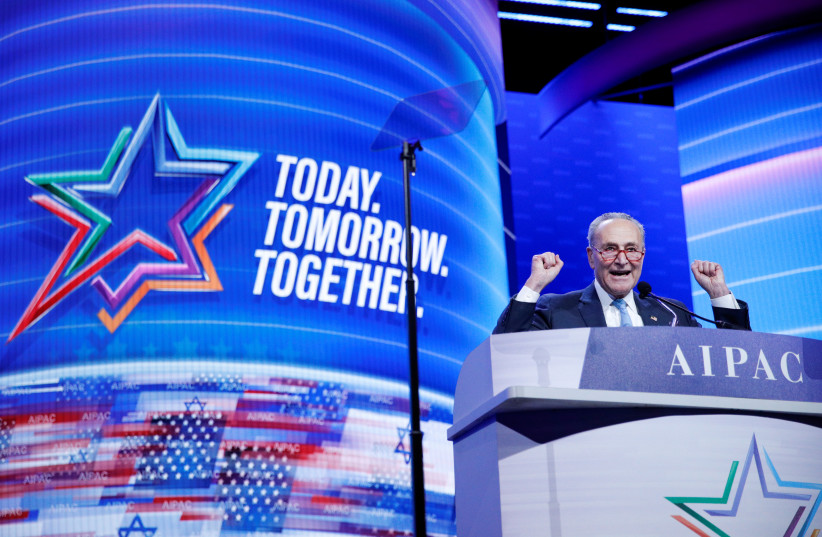AIPAC is boasting that its brand-new PAC spent over $17 million on 365 candidates this year, making it – in AIPAC’s words – the “largest political action committee in the country” and only in its first year. That may be true – but at what price?
Many of those millions, mostly from Jewish contributors, were spent trying to reelect dozens of insurrectionists, election deniers, white supremacists, racists and homophobes, all of whom the American Israel Public Affairs Committee declared “stand with Israel.” All the while the group turned a deaf ear to growing Republican efforts to tap antisemitism and white nationalism in a display of shocking indifference to the interests of an increasingly vulnerable American Jewish community.
It even targeted a Jewish congressman whom it considered too supportive of Israeli-Palestinian peace negotiations and backed a right-wing election denier against a moderate Jewish challenger. In a third contest, it decided not to support a Jewish candidate, perhaps because he wants a “reinvigorated” peace process, but he won anyway. All three considered themselves good Zionists. But not good enough for AIPAC.
It endorsed some of the most extreme MAGA Republicans, including Reps. Jim Jordan (R-Ohio) and Scott Perry (R-Penn.), founder and current leader of the Freedom Caucus, respectively, which has preached about the xenophobic “great replacement theory,” which reeks of antisemitism.
AIPAC defends endorsing insurrectionists and deniers by insisting it is a one-issue lobby. Yet it concealed the Israel connection in many of its ads and kept it out of the name of its super PAC, the United Democracy Project. In fact, none of its attacks and endorsements mentioned Israel. Why conceal the connection? After all, wasn’t that the motivation for the endorsement or attack, supporting Israel?

Why conceal the connection with Israel?
The first word in AIPAC’s name is American, and it lauds Israel as the Mideast’s only democracy, suggesting that democratic governance is a core value, yet it spent millions to elect politicians who backed a conspiracy to overthrow a presidential election and threatened American democracy. Rep. Liz Cheney (R-Wyoming) accused AIPAC of “playing a dangerous game of politics.”
I THOUGHT AIPAC had a winning formula when it came to campaigns: “We don’t rate or endorse candidates.” Money decisions were left to the individual members. That provided effective cover for its lobbyists to deal with issues and avoid campaign contributions.
I spent nine years as AIPAC’s legislative director and found that separation was critical to avoiding partisan politics and eluding what I called the “ka-ching factor” of a politician hearing the ring of the cash register when a lobbyist walked in.
AIPAC’s smaller rival, J Street, has a PAC but it also clearly focused on supporting pro-peace candidates. The left-leaning group, which was outspent three-to-one, is likely to harvest the fruits of AIPAC’s multi-million-dollar decision to abandon its traditional non-partisanship and embrace candidates anathema to the majority of American Jews.
J Street President Jeremy Ben-Ami says his group represents the “large mainstream majority of Jewish Americans, who reject the Ethno-nationalist extremism of the MAGA Republican movement, and the hawkish, harmful foreign policy promoted by the Right.”
AIPAC, and the Likud governments it tends to favor, have long leaned to the Right and embraced Republican politics despite the fact American Jews consistently vote 70-80% Democrat.
AIPAC’s endorsement of some of the most extreme and divisive members of Congress raises doubts about whether it was ever serious about mending fences with Democrats and Jews that the group has alienated over recent years.
Democrats increasingly see the pro-Israel cause as inseparable from the Right fringe, particularly when AIPAC is working to elect those who sought to undermine American democracy.
AIPAC's new test
THE LOBBY group will face another test when a new government is seated in Jerusalem. It will be headed by once and future prime minister Benjamin Netanyahu, who has a close relationship with AIPAC, a penchant for plunging into American partisan politics, and a long history of conflict with Democratic presidents.
His new government could be a source of heartburn for Democrats and most American Jews. It is expected to be the most extreme in Israeli history, dominated by ultra-nationalists, ultra-Orthodox and a criminal fringe.

At the top will be a prime minister currently on trial for bribery and fraud. Other power brokers jockeying for key cabinet posts include a twice-convicted felon imprisoned for financial crimes, Arye Deri, who wants to be the next finance minister; a man convicted of racist incitement and a former supporter of the banned terrorist group Kach, Itamar Ben-Gvir, who wants to be public security minister; Bezalel Smotrich, a self-proclaimed “proud homophobe” who wants to expand settlements, annex most of the West Bank and be defense minister.
This is certain to alienate many American Jews – and other friends – and accelerate the drift from active support for the Jewish state that has worried community leaders here in recent years. The Religious Zionist Party, the largest of Netanyahu’s coalition partners, is demanding changing the status quo on the Temple Mount, ending public transit on Shabbat, encouraging West Bank Palestinians to emigrate, restricting the Law of Return, limiting rights for LGBTQ people, and allowing the Knesset to override the High Court rulings.
And as a gift for a prime minister in the criminal dock they’re proposing judiciary “reforms” that will effectively drop the charges against him and give him a cloak of immunity for future crimes.
This may be the government that Israelis elected. That is their right. It reflects a country moving farther to the Right, with an increasing tolerance for genuine extremists, bigots and criminals. Strategic relations with the US can expect to be unchanged, but there may be conflicts in other areas. Already, the Biden administration is quietly sending word it might boycott ministers who are too extreme.
The Biden administration is under no illusion that the peace process can be resuscitated under the current Palestinian and incoming Israeli leadership. Donald Trump was right on one thing when he told Israeli journalist Barak Ravid, “I don’t think Bibi ever wanted to make peace with the Palestinians.” And Netanyahu’s coalition partners are even more hostile to the idea.
Republicans are likely to have a small majority in the House of Representatives and, as with previous Democratic presidents, they will try to make Israel a partisan football for the next election. Look for them to introduce symbolic legislation, pass resolutions and hold hearings as part of a “we love Israel more” strategy to try to force Democrats to appear to be opposing the Israeli government.
Many of those pushing these gotcha measures will be among the election deniers and MAGA Republicans that AIPAC spent millions electing to Congress. Don’t be surprised if AIPAC praises them for their strong support of the US-Israel friendship.
It’s called a return on the investment, but the deal will likely be seen as a terrible one by an American Jewish mainstream that rejects extremism both here and in Israel, and which is genuine in its commitment to democratic values.
The writer is a Washington-based journalist, consultant, lobbyist and former AIPAC legislative director.
